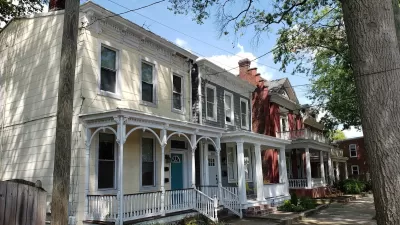A new report by the Center for Budget and Policy Priorities finds major flaws with property taxes in several states, and proposes a solution that could mitigate the least desirable consequences of limits to property tax increases.

Brian J. Charles shares the findings of a new report by the Center for Budget and Policy Priorities (CBPP) that issues a sharp critique of property tax caps.
The tax caps, which first became popular during the 1970s tax revolt and have since spread to 44 states plus the District of Columbia, have created fiscal stress for the states that adopted the limits. As a result, states have cut aid to cities and counties, and municipalities have become more reliant on sales taxes and fees that disproportionately hurt the poor and people of color.
The study examined property taxes in Michigan, Massachusetts, Oregon, and New York, explains Charles. The findings show evidence that the caps "strangle" funding for public education, "which the researchers see as a pathway for minority and low-income children to move up the socioeconomic ladder," while benefitting wealthy white homeowners, "because they have historically owned homes at a greater rate than people of color and on average own more valuable homes."
The Center for Budget and Policy Priorities (CBPP) includes a proposed solution to solve these issues in the report. "Right now, most states limit the annual increase in property taxes to 1.5 or 2.5 percent or the rate of inflation -- whichever number is lower. Setting the limit instead at whichever number is higher, the researchers say, would provide more cash for governments and make revenues more predictable," explains Charles.
For more on the property tax situation around the country, see also Planetizen coverage of the Lincoln Institute of Land Policy's annual "50-State Property Tax Comparison Study."
FULL STORY: The Downsides of Property Tax Caps

Maui's Vacation Rental Debate Turns Ugly
Verbal attacks, misinformation campaigns and fistfights plague a high-stakes debate to convert thousands of vacation rentals into long-term housing.

Planetizen Federal Action Tracker
A weekly monitor of how Trump’s orders and actions are impacting planners and planning in America.

Chicago’s Ghost Rails
Just beneath the surface of the modern city lie the remnants of its expansive early 20th-century streetcar system.

Bend, Oregon Zoning Reforms Prioritize Small-Scale Housing
The city altered its zoning code to allow multi-family housing and eliminated parking mandates citywide.

Amtrak Cutting Jobs, Funding to High-Speed Rail
The agency plans to cut 10 percent of its workforce and has confirmed it will not fund new high-speed rail projects.

LA Denies Basic Services to Unhoused Residents
The city has repeatedly failed to respond to requests for trash pickup at encampment sites, and eliminated a program that provided mobile showers and toilets.
Urban Design for Planners 1: Software Tools
This six-course series explores essential urban design concepts using open source software and equips planners with the tools they need to participate fully in the urban design process.
Planning for Universal Design
Learn the tools for implementing Universal Design in planning regulations.
planning NEXT
Appalachian Highlands Housing Partners
Mpact (founded as Rail~Volution)
City of Camden Redevelopment Agency
City of Astoria
City of Portland
City of Laramie





























